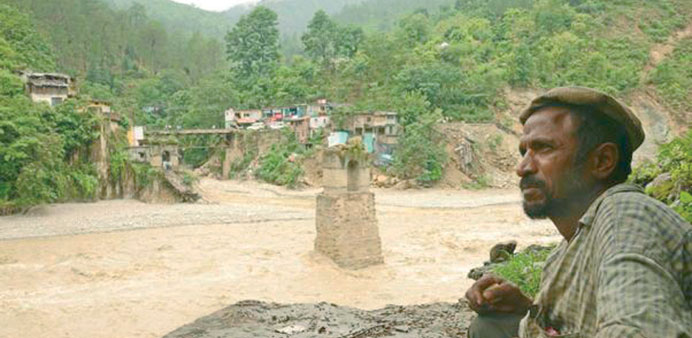|
Hundreds of villagers who worked along the pilgrim route to Kedarnath as porters, labourers and vendors are missing in the rain and flood tragedy that has hit Uttarakhand, says an expert. |
“The national media has reported the rain and flood tragedy at the four pilgrim spots, the Char Dham of Kedarnath. Badrinath. Gangotri and Yamunotri… But beyond the pilgrimage spots the tragedy has a lot of ramifications for locals, the most important being loss of livelihood,” Ravi Chopra, director of People’s Science Institute in Dehradun and member of the National Ganga River Basin Authority, said.
According to Chopra, hundreds of men from villages in Mandakini Valley surrounding Kedarnath temple town earn their livelihoods along the 14km pilgrimage route, working as porters to carry children, women or elderly on their backs, selling knick-knacks like chips or bottled water and raincoats and also run the many dhabas, eateries that dot the winding mountain road.
“Many of the menfolk are missing... Now with the yatra (pilgrimage) season over, and we don’t know when it will resume, the villagers have been hit hard,” Chopra said.
His colleague had reported that in one village in Guptkashi, 22km away, 78 men who were working in Kedarnath were missing.
Besides the pilgrimage season, villagers also depend on the tourism season for their livelihood. “It is their main source of livelihood,” Chopra said.
Thousands of buildings and homes, bridges and roads have been destroyed in the tragedy, badly hitting the tourism season.
The incessant rains that hit the state over three days from June 14, leading to flash floods and cloudbursts, have claimed hundreds of lives and hundreds others are missing. Over 70,000 stranded people, including pilgrims and tourists, have been rescued by the armed forces.
Another aspect of the human tragedy is that the floods have destroyed not just the farmland but also the irrigation system in the mountains, including the network of canals and irrigation channels, said Chopra whose organisation has been working in the Mandakini Valley for the past 15 years.
“The canals are gone, the irrigation system is gone... this has compounded the loss for the villagers,” Chopra said.
The state authorities have said the Kedarnath pilgrimage, which sees hundreds of thousands of pilgrims travelling each year, may not resume for some years. Most tourists have cancelled plans to travel to Uttarakhand following the tragedy.
According to Chopra, the state earns around Rs25bn a year through tourism.
l After days of humidity and high temperatures, heavy rains lashed Uttar Pradesh yesterday. With many rivers across the state in spate, officials say that at least 16 districts face flood-like situation.
Water has entered many villages in Unnao, Barabanki, Farukkhabad, Faizabad and Bahraich districts and at least 16 districts face flood-like situation, a state government official said.
According to the state relief commissioner’s office in the state capital Lucknow, the Sharda river in the Lakhimpur Kheri district has breached the danger mark owing to heavy rainfall and release of water from the Banbasa barrage near the India-Nepal border.
Around 150,000 people in 134 villages in Lakhimpur Kheri are facing flood-like situation, while the number of people facing similar situation in 32 villages of Sitapur district is around 119,000, an official in the state relief commissioner’s office said.
Although the rains brought some respite from the sweltering weather to the people of the state, many parts of Lucknow were inundated and life in the old part of the city came to a grinding halt.

